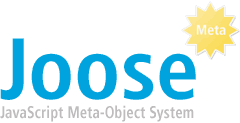
JavaScript, often abbreviated as JS, is a programming language and core technology of the Web, alongside HTML and CSS. 99% of websites use JavaScript on the client side for webpage behavior.
Prototype-based programming is a style of object-oriented programming in which behaviour reuse is performed via a process of reusing existing objects that serve as prototypes. This model can also be known as prototypal, prototype-oriented,classless, or instance-based programming.
In object-oriented programming languages, a mixin is a class that contains methods for use by other classes without having to be the parent class of those other classes. How those other classes gain access to the mixin's methods depends on the language. Mixins are sometimes described as being "included" rather than "inherited".
Jakarta Faces, formerly Jakarta Server Faces and JavaServer Faces (JSF) is a Java specification for building component-based user interfaces for web applications. It was formalized as a standard through the Java Community Process as part of the Java Platform, Enterprise Edition. It is an MVC web framework that simplifies the construction of user interfaces (UI) for server-based applications by using reusable UI components in a page.

Raku is a member of the Perl family of programming languages. Formerly known as Perl 6, it was renamed in October 2019. Raku introduces elements of many modern and historical languages. Compatibility with Perl was not a goal, though a compatibility mode is part of the specification. The design process for Raku began in 2000.

A dynamic web page is a web page constructed at runtime, as opposed to a static web page, delivered as it is stored. A server-side dynamic web page is a web page whose construction is controlled by an application server processing server-side scripts. In server-side scripting, parameters determine how the assembly of every new web page proceeds, and including the setting up of more client-side processing. A client-side dynamic web page processes the web page using JavaScript running in the browser as it loads. JavaScript can interact with the page via Document Object Model (DOM), to query page state and modify it. Even though a web page can be dynamic on the client-side, it can still be hosted on a static hosting service such as GitHub Pages or Amazon S3 as long as there is not any server-side code included.

Catalyst is an open source web application framework written in Perl, that closely follows the model–view–controller (MVC) architecture, and supports a number of experimental web patterns. It is written using Moose, a modern object system for Perl. Its design is heavily inspired by frameworks such as Ruby on Rails, Maypole, and Spring.
Echo is a web application framework created by the company NextApp. The latest iteration, Echo3, allows writing applications in either server-side Java or client-side JavaScript. Server-side applications do not require developer knowledge of HTML, HTTP, or JavaScript. Client-side JavaScript-based applications do not require a server, but can communicate with one via AJAX.

Aptana, Inc. is a company that makes web application development tools for use with a variety of programming languages. Aptana's main products include Aptana Studio, Aptana Cloud and Aptana Jaxer.
The Prototype JavaScript Framework is a JavaScript framework created by Sam Stephenson in February 2005 as part of Ajax support in Ruby on Rails. It is implemented as a single file of JavaScript code, usually named prototype.js. Prototype is distributed standalone, but also as part of larger projects, such as Ruby on Rails, script.aculo.us and Rico. As of March 2021, according to w3techs, Prototype is used by 0.6% of all websites.

qooxdoo is an open-source Ajax web application framework. It is an LGPL- and/or EPL-licensed client-side and server-agnostic solution, and includes support for professional JavaScript development, a graphical user interface (GUI) toolkit and high-level client-server communication.
jQuery is a JavaScript library designed to simplify HTML DOM tree traversal and manipulation, as well as event handling, CSS animations, and Ajax. It is free, open-source software using the permissive MIT License. As of August 2022, jQuery is used by 77% of the 10 million most popular websites. Web analysis indicates that it is the most widely deployed JavaScript library by a large margin, having at least three to four times more usage than any other JavaScript library.
MooTools is a lightweight, object-oriented JavaScript framework. It is released under the free, open-source MIT License.
Moose is an extension of the object system of the Perl programming language. Its stated purpose is to bring modern object-oriented language features to Perl 5, and to make object-oriented Perl programming more consistent and less tedious.

Pyjs, is a rich web application framework for developing client-side web and desktop applications in Python. The resulting applications can be run in a web browser or as standalone desktop applications.

Object-oriented programming (OOP) is a programming paradigm based on the concept of objects, which can contain data and code: data in the form of fields, and code in the form of procedures. In OOP, computer programs are designed by making them out of objects that interact with one another.
The structure of the Perl programming language encompasses both the syntactical rules of the language and the general ways in which programs are organized. Perl's design philosophy is expressed in the commonly cited motto "there's more than one way to do it". As a multi-paradigm, dynamically typed language, Perl allows a great degree of flexibility in program design. Perl also encourages modularization; this has been attributed to the component-based design structure of its Unix roots, and is responsible for the size of the CPAN archive, a community-maintained repository of more than 100,000 modules.
Smart Pascal is a Object Pascal programming language that is derived from Delphi Web Script, its adapted for Smart Mobile Studio, commercial development JavaScript, machine code.
This is a list of articles related to the JavaScript programming language.








